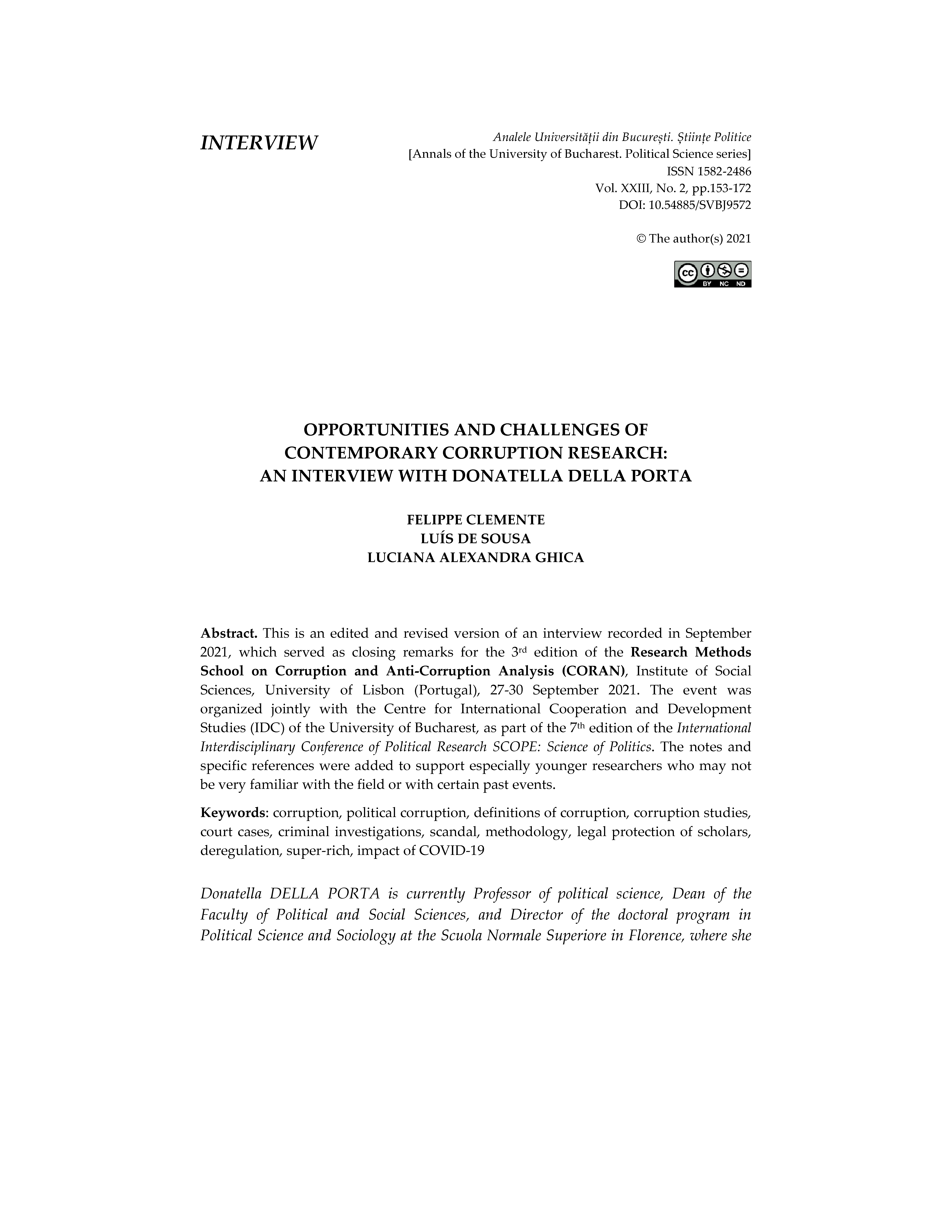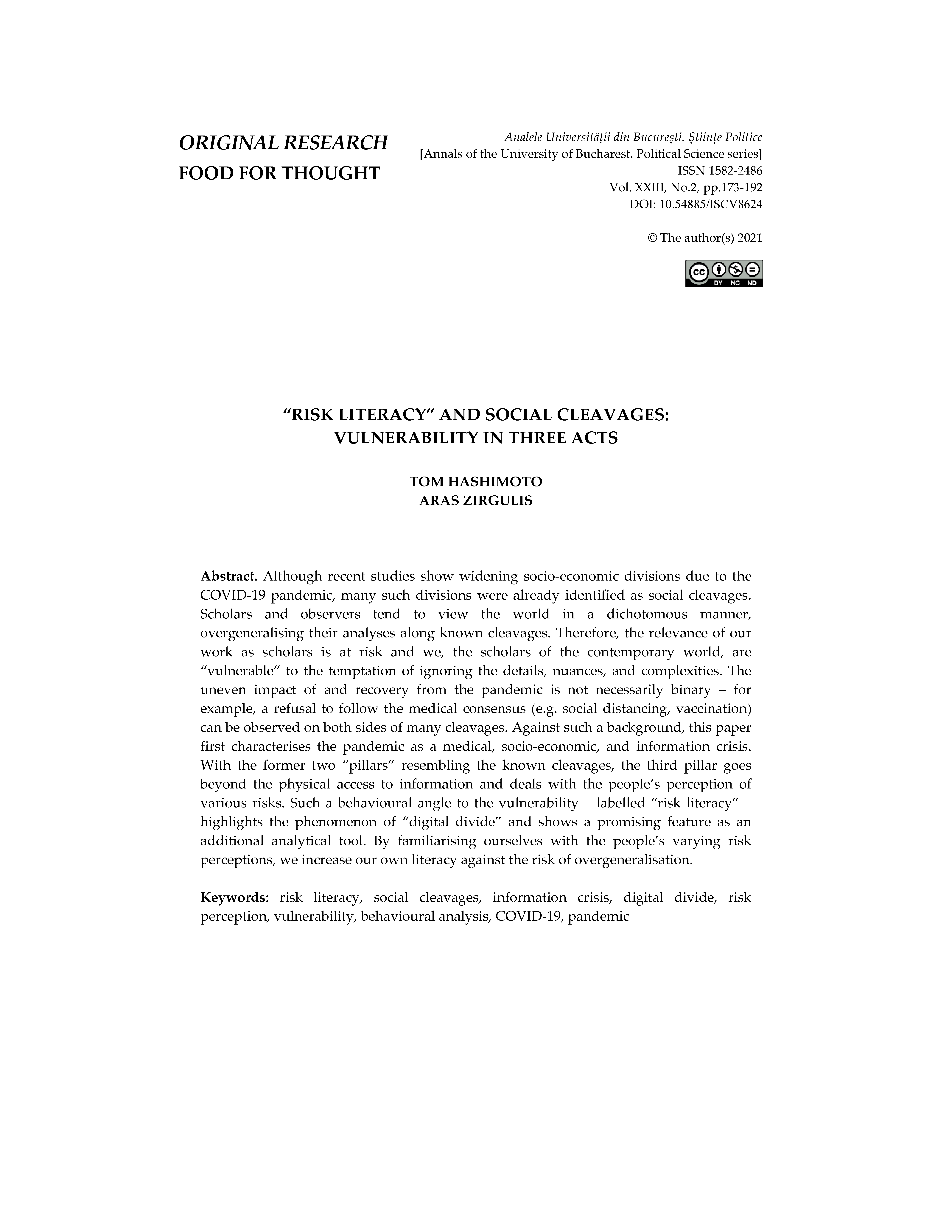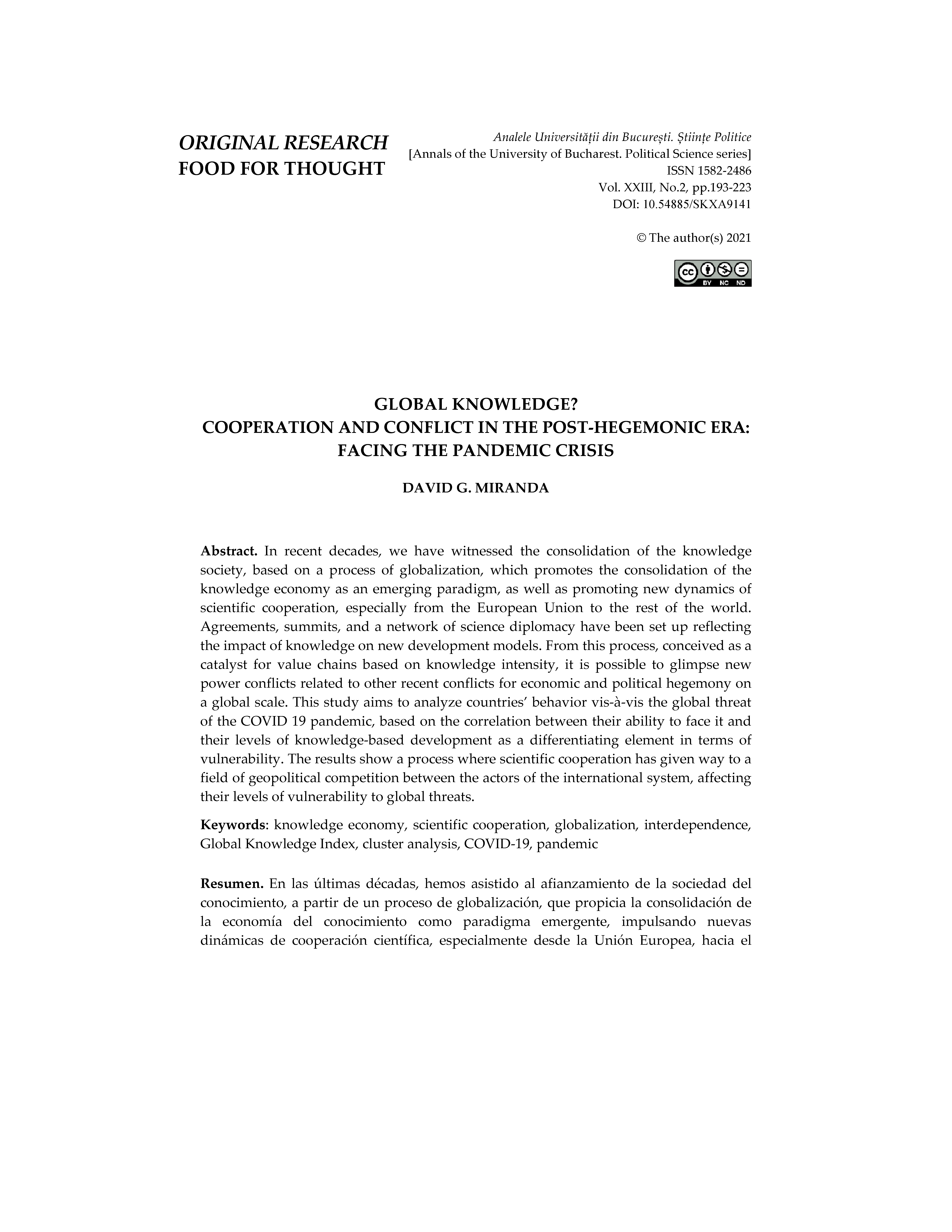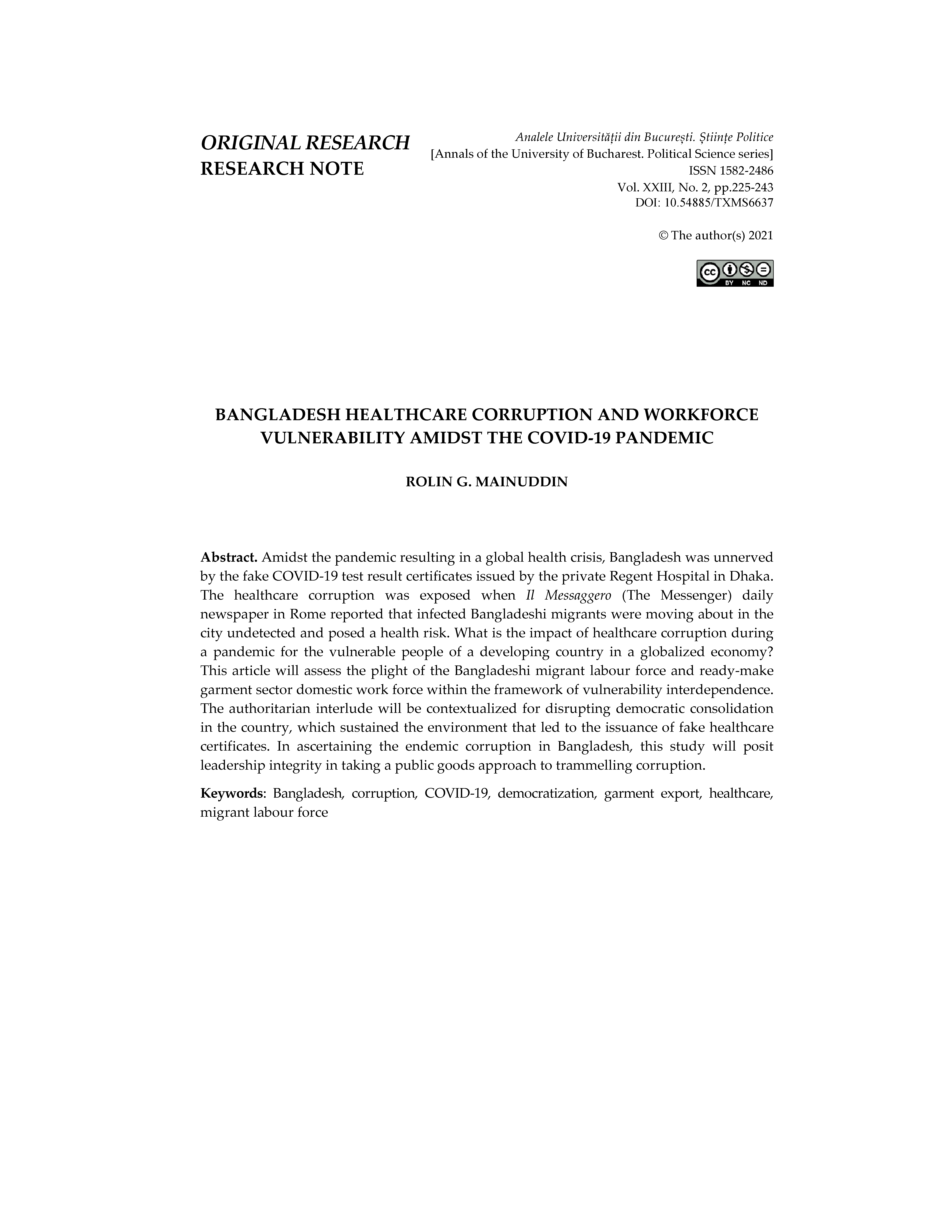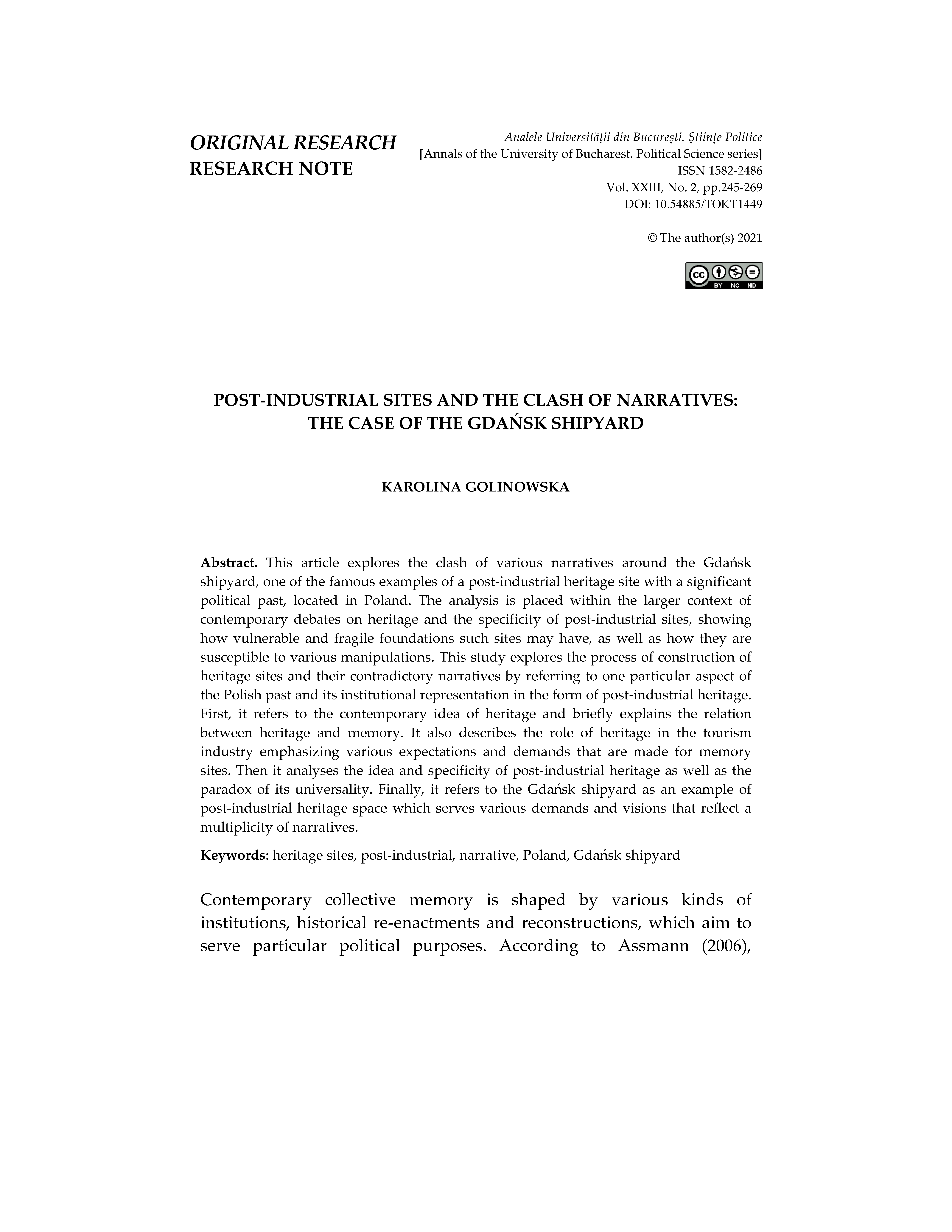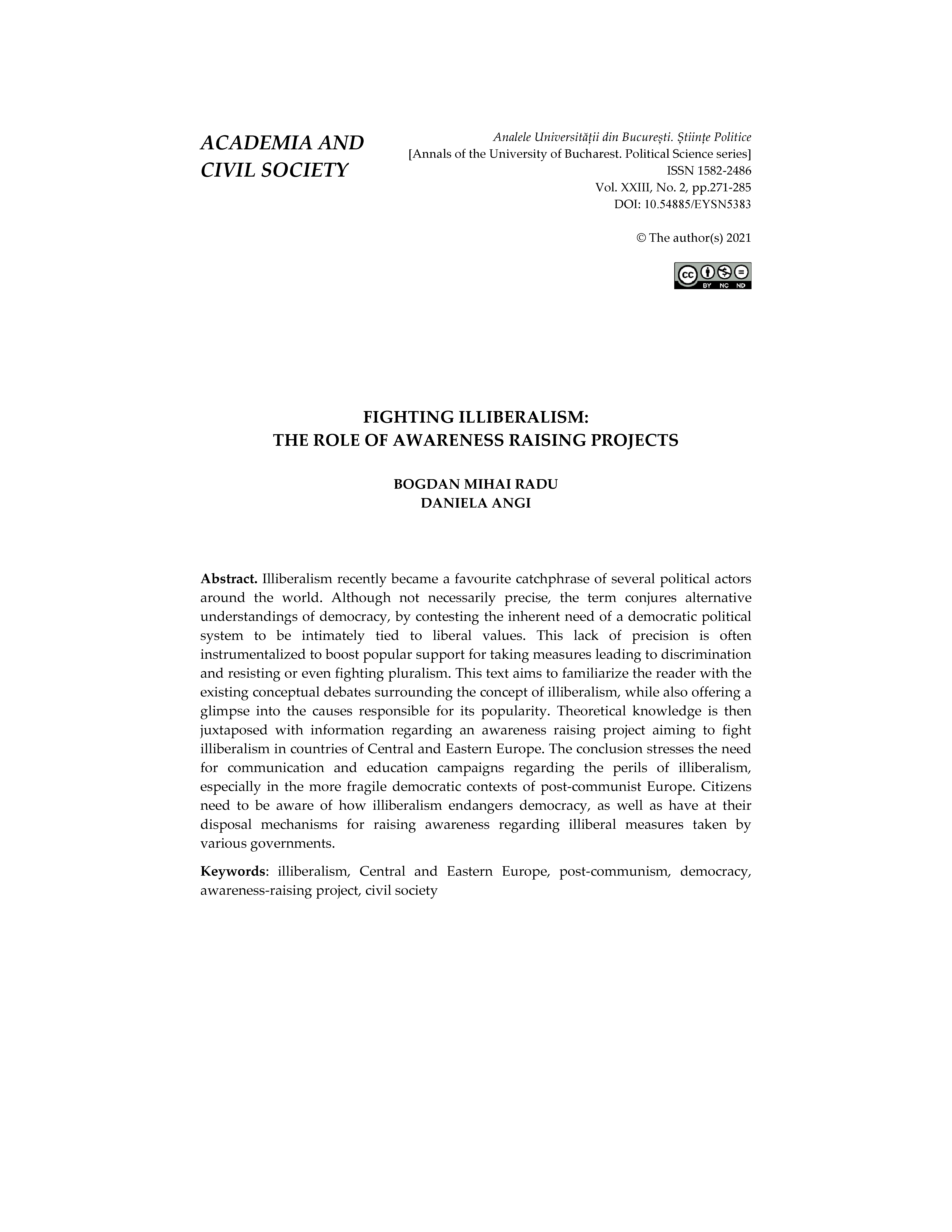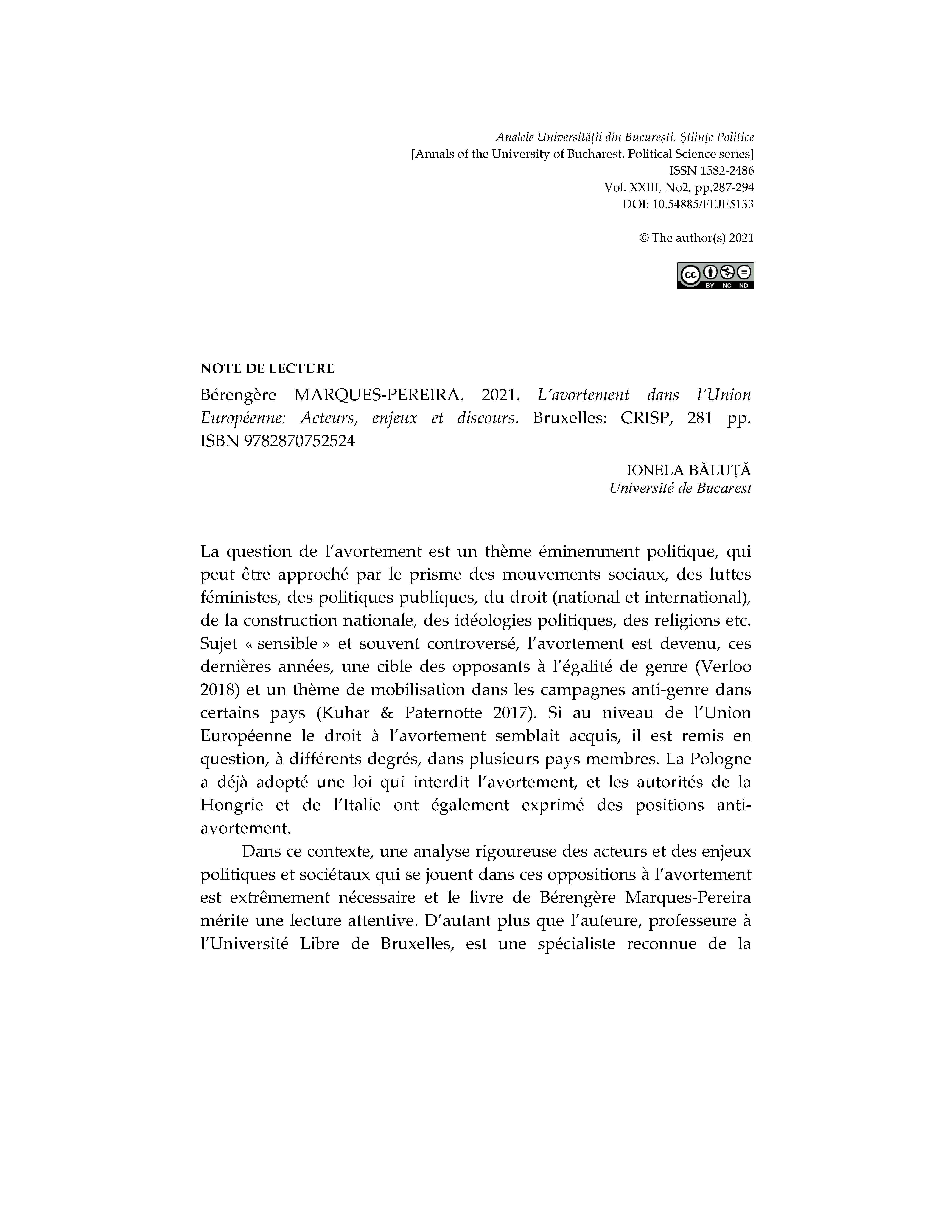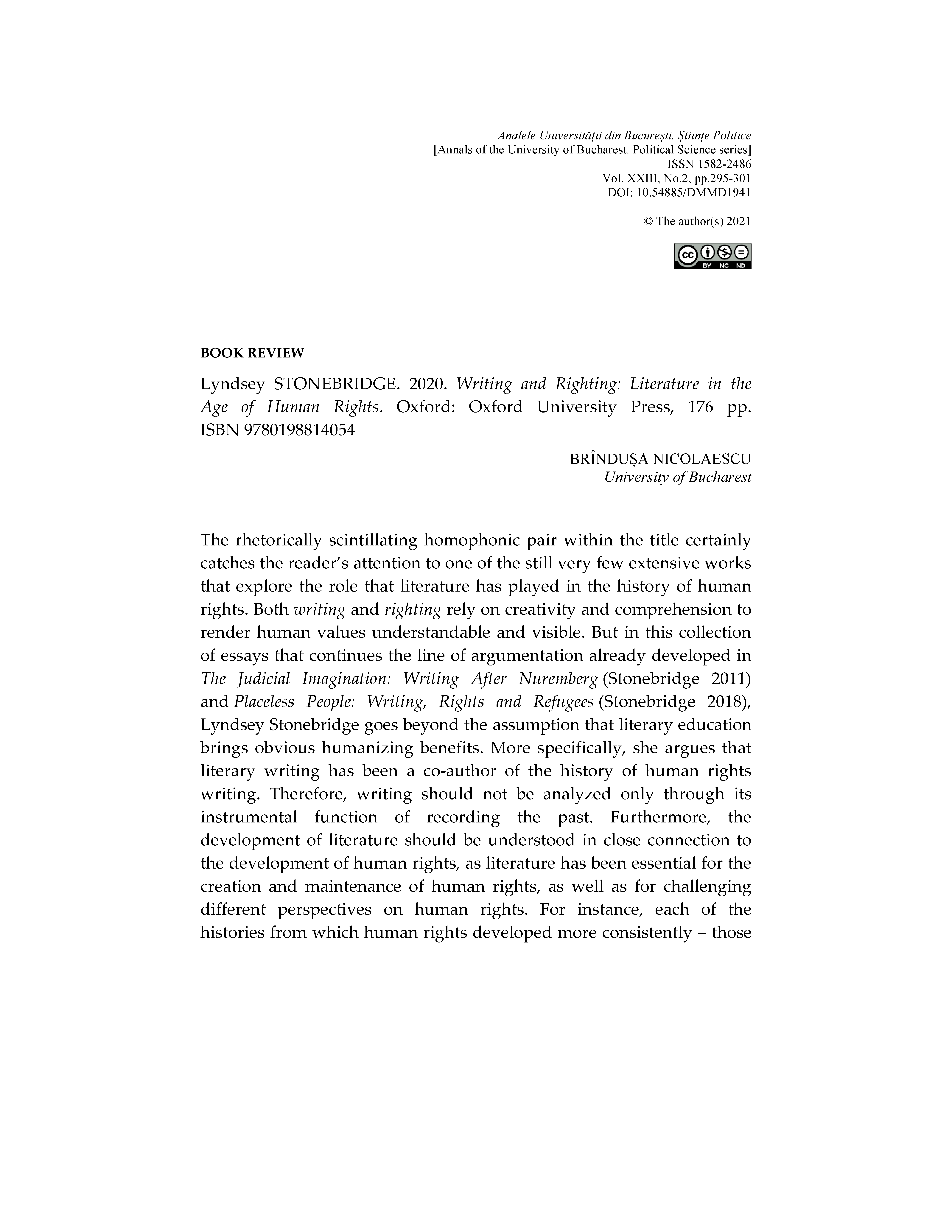Vol. 23 No. 2 (2021): Analele Universității din București. Științe Politice
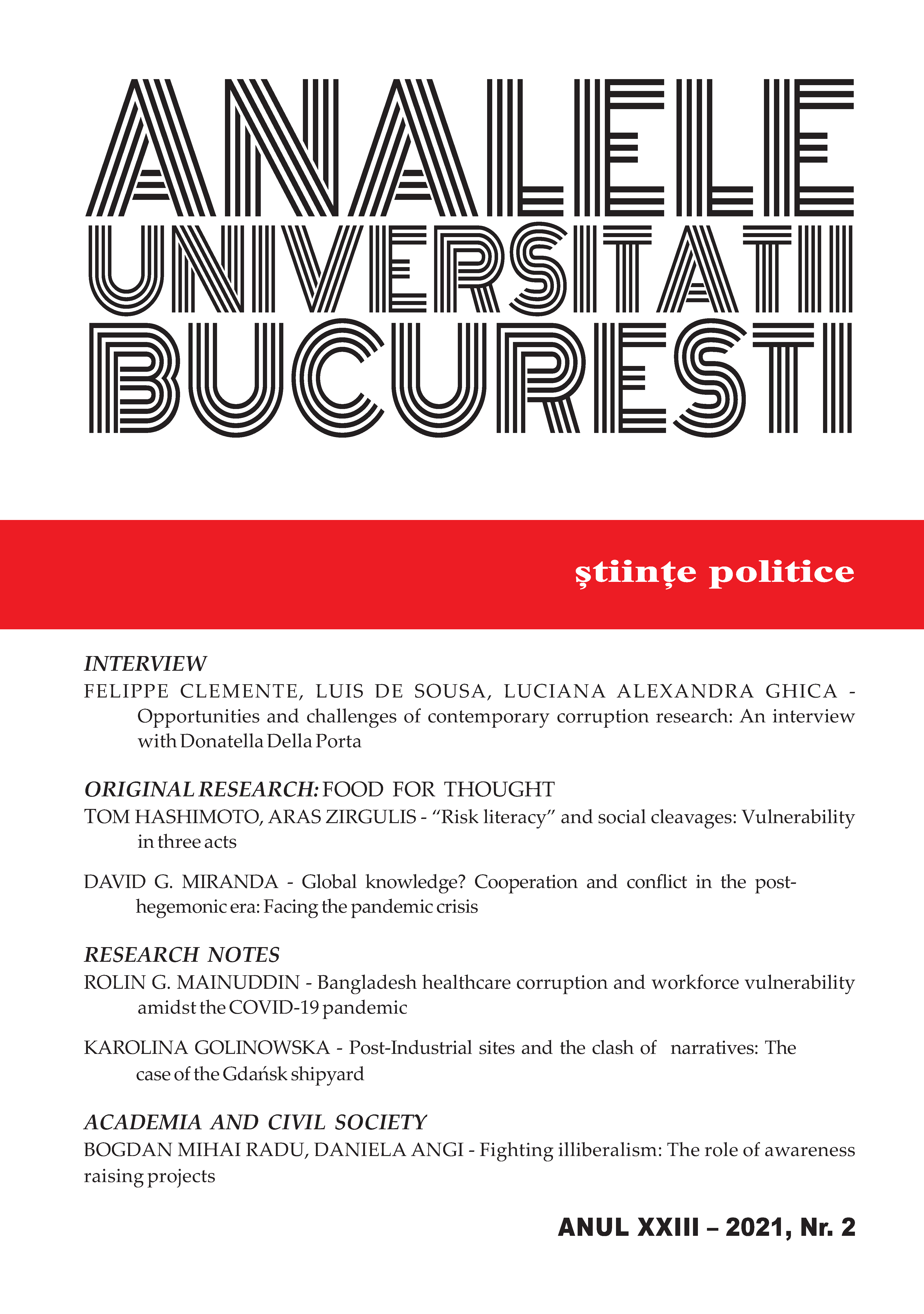
The journal welcomes original articles in English, French, or Romanian in all fields of political science and related research areas, including political theory, political sociology, international relations, political history, law and political economy. The journal aims to stimulate original and innovative research through the development of new spaces for high-quality academic encounters at both national and international level. We are looking for contributions from both well-established scholars and young researchers, including shorter pieces such as reviews and review essays.
Full Issue
Interview
-
OPPORTUNITIES AND CHALLENGES OF CONTEMPORARY CORRUPTION RESEARCH: AN INTERVIEW WITH DONATELLA DELLA PORTA
Abstract
This is an edited and revised version of an interview recorded in September 2021, which served as closing remarks for the 3rd edition of the Research Methods School on Corruption and Anti-Corruption Analysis (CORAN), Institute of Social Sciences, University of Lisbon (Portugal), 27-30 September 2021. The event was
organized jointly with the Centre for International Cooperation and Development Studies (IDC) of the University of Bucharest, as part of the 7th edition of the International Interdisciplinary Conference of Political Research SCOPE: Science of Politics. The notes and specific references were added to support especially younger researchers who may not be very familiar with the field or with certain past events.
Original Research
-
“RISK LITERACY” AND SOCIAL CLEAVAGES: VULNERABILITY IN THREE ACTS
Abstract
Although recent studies show widening socio-economic divisions due to the COVID-19 pandemic, many such divisions were already identified as social cleavages. Scholars and observers tend to view the world in a dichotomous manner, overgeneralising their analyses along known cleavages. Therefore, the relevance of our work as scholars is at risk and we, the scholars of the contemporary world, are “vulnerable” to the temptation of ignoring the details, nuances, and complexities. The uneven impact of and recovery from the pandemic is not necessarily binary – for example, a refusal to follow the medical consensus (e.g. social distancing, vaccination) can be observed on both sides of many cleavages. Against such a background, this paper first characterises the pandemic as a medical, socio-economic, and information crisis. With the former two “pillars” resembling the known cleavages, the third pillar goes beyond the physical access to information and deals with the people’s perception of various risks. Such a behavioural angle to the vulnerability – labelled “risk literacy” – highlights the phenomenon of “digital divide” and shows a promising feature as an additional analytical tool. By familiarising ourselves with the people’s varying risk
perceptions, we increase our own literacy against the risk of overgeneralisation. -
GLOBAL KNOWLEDGE? COOPERATION AND CONFLICT IN THE POST-HEGEMONIC ERA: FACING THE PANDEMIC CRISIS
Abstract
In recent decades, we have witnessed the consolidation of the knowledge society, based on a process of globalization, which promotes the consolidation of the knowledge economy as an emerging paradigm, as well as promoting new dynamics of scientific cooperation, especially from the European Union to the rest of the world. Agreements, summits, and a network of science diplomacy have been set up reflecting the impact of knowledge on new development models. From this process, conceived as a catalyst for value chains based on knowledge intensity, it is possible to glimpse new power conflicts related to other recent conflicts for economic and political hegemony on a global scale. This study aims to analyze countries’ behavior vis-à-vis the global threat of the COVID 19 pandemic, based on the correlation between their ability to face it and their levels of knowledge-based development as a differentiating element in terms of
vulnerability. The results show a process where scientific cooperation has given way to a field of geopolitical competition between the actors of the international system, affecting their levels of vulnerability to global threats. -
BANGLADESH HEALTHCARE CORRUPTION AND WORKFORCE VULNERABILITY AMIDST THE COVID-19 PANDEMIC
Abstract
Amidst the pandemic resulting in a global health crisis, Bangladesh was unnerved by the fake COVID-19 test result certificates issued by the private Regent Hospital in Dhaka. The healthcare corruption was exposed when Il Messaggero (The Messenger) daily newspaper in Rome reported that infected Bangladeshi migrants were moving about in the city undetected and posed a health risk. What is the impact of healthcare corruption during a pandemic for the vulnerable people of a developing country in a globalized economy? This article will assess the plight of the Bangladeshi migrant labour force and ready-make garment sector domestic work force within the framework of vulnerability interdependence. The authoritarian interlude will be contextualized for disrupting democratic consolidation in the country, which sustained the environment that led to the issuance of fake healthcare certificates. In ascertaining the endemic corruption in Bangladesh, this study will posit leadership integrity in taking a public goods approach to trammelling corruption.
-
POST-INDUSTRIAL SITES AND THE CLASH OF NARRATIVES: THE CASE OF THE GDAŃSK SHIPYARD
Abstract
This article explores the clash of various narratives around the Gdańsk shipyard, one of the famous examples of a post-industrial heritage site with a significant political past, located in Poland. The analysis is placed within the larger context of contemporary debates on heritage and the specificity of post-industrial sites, showing how vulnerable and fragile foundations such sites may have, as well as how they are susceptible to various manipulations. This study explores the process of construction of heritage sites and their contradictory narratives by referring to one particular aspect of the Polish past and its institutional representation in the form of post-industrial heritage. First, it refers to the contemporary idea of heritage and briefly explains the relation between heritage and memory. It also describes the role of heritage in the tourism industry emphasizing various expectations and demands that are made for memory sites. Then it analyses the idea and specificity of post-industrial heritage as well as the paradox of its universality. Finally, it refers to the Gdańsk shipyard as an example of post-industrial heritage space which serves various demands and visions that reflect a multiplicity of narratives.
Academia and Civil Society
-
FIGHTING ILLIBERALISM: THE ROLE OF AWARENESS RAISING PROJECTS
Abstract
Illiberalism recently became a favourite catchphrase of several political actors around the world. Although not necessarily precise, the term conjures alternative understandings of democracy, by contesting the inherent need of a democratic political system to be intimately tied to liberal values. This lack of precision is often instrumentalized to boost popular support for taking measures leading to discrimination and resisting or even fighting pluralism. This text aims to familiarize the reader with the existing conceptual debates surrounding the concept of illiberalism, while also offering a glimpse into the causes responsible for its popularity. Theoretical knowledge is then juxtaposed with information regarding an awareness raising project aiming to fight illiberalism in countries of Central and Eastern Europe. The conclusion stresses the need for communication and education campaigns regarding the perils of illiberalism, especially in the more fragile democratic contexts of post-communist Europe. Citizens need to be aware of how illiberalism endangers democracy, as well as have at their disposal mechanisms for raising awareness regarding illiberal measures taken by various governments.
Book Review
-
Bérengère MARQUES-PEREIRA. 2021. L’avortement dans l’Union Européenne: Acteurs, enjeux et discours. Bruxelles: CRISP, 281 pp. ISBN 9782870752524
Abstract
La question de l’avortement est un thème éminemment politique, qui peut être approché par le prisme des mouvements sociaux, des luttes féministes, des politiques publiques, du droit (national et international), de la construction nationale, des idéologies politiques, des religions etc. Sujet « sensible » et souvent controversé, l’avortement est devenu, ces dernières années, une cible des opposants à l’égalité de genre (Verloo 2018) et un thème de mobilisation dans les campagnes anti-genre dans certains pays (Kuhar & Paternotte 2017). Si au niveau de l’Union Européenne le droit à l’avortement semblait acquis, il est remis en question, à différents degrés, dans plusieurs pays membres. La Pologne a déjà adopté une loi qui interdit l’avortement, et les autorités de la Hongrie et de l’Italie ont également exprimé des positions antiavortement.
-
Lyndsey STONEBRIDGE. 2020. Writing and Righting: Literature in the Age of Human Rights. Oxford: Oxford University Press, 176 pp. ISBN 9780198814054
Abstract
The rhetorically scintillating homophonic pair within the title certainly catches the reader’s attention to one of the still very few extensive works that explore the role that literature has played in the history of human rights. Both writing and righting rely on creativity and comprehension to render human values understandable and visible. But in this collection of essays that continues the line of argumentation already developed in The Judicial Imagination: Writing After Nuremberg (Stonebridge 2011) and Placeless People: Writing, Rights and Refugees (Stonebridge 2018), Lyndsey Stonebridge goes beyond the assumption that literary education brings obvious humanizing benefits.

